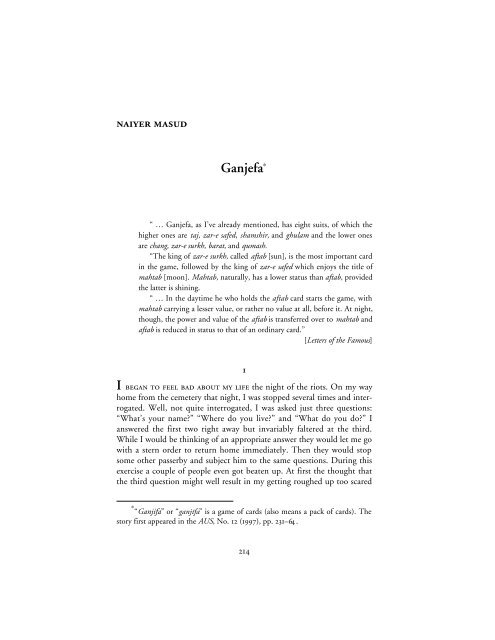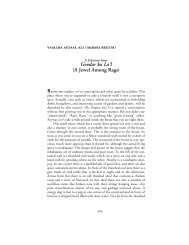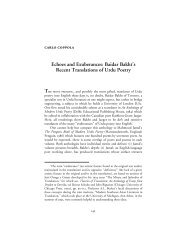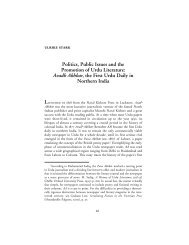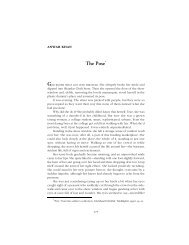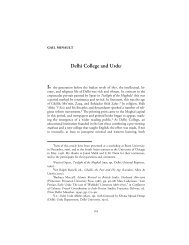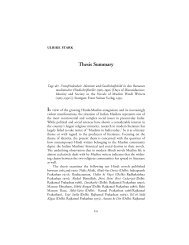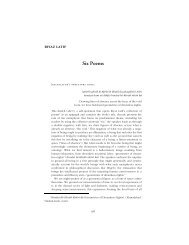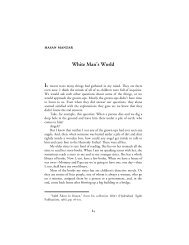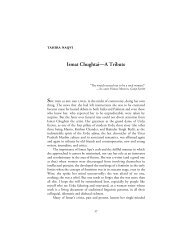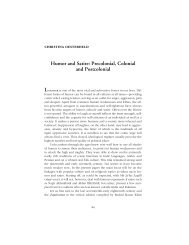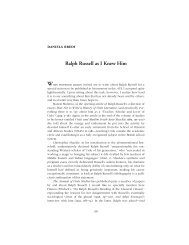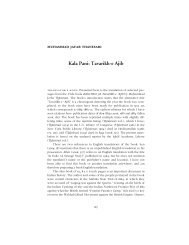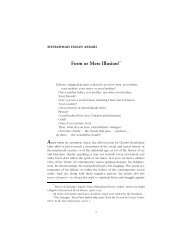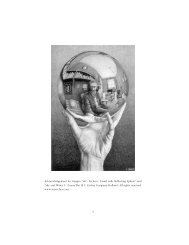Ganjefa - the Annual of Urdu Studies
Ganjefa - the Annual of Urdu Studies
Ganjefa - the Annual of Urdu Studies
You also want an ePaper? Increase the reach of your titles
YUMPU automatically turns print PDFs into web optimized ePapers that Google loves.
NAIYER MASUD<br />
<strong>Ganjefa</strong> ∗<br />
“ … <strong>Ganjefa</strong>, as I’ve already mentioned, has eight suits, <strong>of</strong> which <strong>the</strong><br />
higher ones are taj, zar-e safed, shamshir, and ghulam and <strong>the</strong> lower ones<br />
are chang, zar-e surkh, barat, and qumash.<br />
“The king <strong>of</strong> zar-e surkh, called aftab [sun], is <strong>the</strong> most important card<br />
in <strong>the</strong> game, followed by <strong>the</strong> king <strong>of</strong> zar-e safed which enjoys <strong>the</strong> title <strong>of</strong><br />
mahtab [moon]. Mahtab, naturally, has a lower status than aftab, provided<br />
<strong>the</strong> latter is shining.<br />
“ … In <strong>the</strong> daytime he who holds <strong>the</strong> aftab card starts <strong>the</strong> game, with<br />
mahtab carrying a lesser value, or ra<strong>the</strong>r no value at all, before it. At night,<br />
though, <strong>the</strong> power and value <strong>of</strong> <strong>the</strong> aftab is transferred over to mahtab and<br />
aftab is reduced in status to that <strong>of</strong> an ordinary card.”<br />
[Letters <strong>of</strong> <strong>the</strong> Famous]<br />
1<br />
I BEGAN TO FEEL BAD ABOUT MY LIFE <strong>the</strong> night <strong>of</strong> <strong>the</strong> riots. On my way<br />
home from <strong>the</strong> cemetery that night, I was stopped several times and interrogated.<br />
Well, not quite interrogated, I was asked just three questions:<br />
“What’s your name?” “Where do you live?” and “What do you do?” I<br />
answered <strong>the</strong> first two right away but invariably faltered at <strong>the</strong> third.<br />
While I would be thinking <strong>of</strong> an appropriate answer <strong>the</strong>y would let me go<br />
with a stern order to return home immediately. Then <strong>the</strong>y would stop<br />
some o<strong>the</strong>r passerby and subject him to <strong>the</strong> same questions. During this<br />
exercise a couple <strong>of</strong> people even got beaten up. At first <strong>the</strong> thought that<br />
<strong>the</strong> third question might well result in my getting roughed up too scared<br />
∗ “Ganjifa” or “ganjµfa” is a game <strong>of</strong> cards (also means a pack <strong>of</strong> cards). The<br />
story first appeared in <strong>the</strong> AUS, No. 12 (1997), pp. 231–64 .<br />
214
NAIYER MASUD • 215<br />
me quite a bit, so I became nervous trying to answer it, but as I drew<br />
closer to my home I started to feel a bit testy about <strong>the</strong> question itself.<br />
When I was asked, “What do you do?” for <strong>the</strong> last time, I answered in my<br />
heart, “I live <strong>of</strong>f <strong>the</strong> earnings <strong>of</strong> my mo<strong>the</strong>r.”<br />
Fa<strong>the</strong>r had also lived <strong>of</strong>f my mo<strong>the</strong>r’s earnings. Asthma and addiction to<br />
playing <strong>the</strong> lottery had pretty much made him a good-for-nothing. I<br />
never saw him do anything o<strong>the</strong>r than cough away as he lay in bed, or<br />
tear up lottery tickets and toss <strong>the</strong>m away. Mo<strong>the</strong>r managed to pay <strong>the</strong><br />
expenses <strong>of</strong> <strong>the</strong> household from <strong>the</strong> money she earned doing chikan<br />
embroidery work. It was Mo<strong>the</strong>r again who had looked after my education,<br />
during which time she somehow got it into her head that I might<br />
also catch my fa<strong>the</strong>r’s disease so she packed me <strong>of</strong>f to her foster sister in<br />
Allahabad for fur<strong>the</strong>r studies. I’m certain that every month she also sent<br />
this sister a little something extra, over and above my expenses. My fa<strong>the</strong>r<br />
passed away two or three years after I left for Allahabad, but I finished my<br />
education <strong>the</strong>re and only <strong>the</strong>n returned to my native Lucknow. And now,<br />
for <strong>the</strong> past several years, I have merely been roaming around, living <strong>of</strong>f<br />
my mo<strong>the</strong>r’s wages like my fa<strong>the</strong>r before me. If I have done any work at<br />
all, it hasn’t gone beyond lighting a lamp at my fa<strong>the</strong>r’s grave every<br />
Thursday. All <strong>the</strong> same, I had felt good about my life.<br />
The night <strong>of</strong> <strong>the</strong> riots, in trying to answer <strong>the</strong> third question, I saw<br />
this life <strong>of</strong> mine, this life about which I had felt good, play out before me<br />
over and over, each time in exactly <strong>the</strong> same way, until I began to feel<br />
anger toward myself and pity for my mo<strong>the</strong>r, both <strong>of</strong> which, <strong>the</strong> anger as<br />
well as <strong>the</strong> pity, grew worse, especially when I arrived at our door and<br />
found out from <strong>the</strong> neighbors that my mo<strong>the</strong>r, draping her burqa around<br />
her, had ventured out looking for me <strong>the</strong> minute she heard <strong>the</strong> news <strong>of</strong><br />
<strong>the</strong> riots and hadn’t yet returned. They had done <strong>the</strong>ir best to stop her,<br />
but she paid no heed to anyone. It occurred to me that she must also have<br />
been subjected to <strong>the</strong> same questions, “What’s your name?” “Where do<br />
you live?” and “What do you do?” I was about to set out in search <strong>of</strong> her<br />
but <strong>the</strong> neighbors forcibly held me back. Mo<strong>the</strong>r had extracted an oath<br />
from <strong>the</strong>m that in <strong>the</strong> event I returned before she did and attempted to<br />
go out looking for her <strong>the</strong>y wouldn’t allow me to. The neighbors were<br />
asking me about <strong>the</strong> riots but I evaded <strong>the</strong>m by saying that I didn’t know<br />
anything. And that was indeed true. I was worried about Mo<strong>the</strong>r and<br />
wasn’t about to be stopped by <strong>the</strong> neighbors, but I stopped myself<br />
thinking that if she returned while I was gone she would set out searching
216 • THE ANNUAL OF URDU STUDIES<br />
for me again. So I went inside <strong>the</strong> house. In <strong>the</strong> courtyard my meal was<br />
laid out covered with a tray on a chowki and a neighbor woman sat near<br />
it waiting for me. Mo<strong>the</strong>r had also asked her on her oath to make me eat<br />
as soon as I got back. I asked her to leave. I had no urge to eat even<br />
though I was feeling terribly hungry, so I washed my hands and mouth<br />
and sat down near <strong>the</strong> tray. Just <strong>the</strong>n Mo<strong>the</strong>r returned.<br />
Outside, <strong>the</strong> neighbors had already informed her that I was back, safe<br />
and sound. Never<strong>the</strong>less she entered <strong>the</strong> house weeping and wailing as if<br />
she was being brought in to look at my dead body. And when she reached<br />
me she did everything a mo<strong>the</strong>r would do on finding her missing son. I<br />
realized <strong>the</strong>n that she still thought <strong>of</strong> me as a small child accustomed to<br />
holding onto his mo<strong>the</strong>r’s hand as he walked. I also realized that I was<br />
grown up and yet <strong>the</strong>re was only one way I could answer “What do you<br />
do?”<br />
From <strong>the</strong> time she fed me until <strong>the</strong> time she made me lie down on<br />
<strong>the</strong> bed while she patted me, she kept touching me again and again as if<br />
she wasn’t certain I had come back home in one piece. I was now lying<br />
quietly and had started to feel sleepy, while Mo<strong>the</strong>r sat nearby scrutinizing<br />
me. After a while, she asked, “Did something happen?”<br />
“No, nothing,” I answered. “Why?”<br />
“Nothing happened along <strong>the</strong> way?”<br />
“Nothing at all,” I said. “Why do you ask?”<br />
“Did someone say something?”<br />
“No.”<br />
She continued staring at me, and <strong>the</strong>n said, “From now on I won’t let<br />
you go out anymore.”<br />
At that point I said, “From now on, Mo<strong>the</strong>r, I won’t live <strong>of</strong>f your<br />
earnings.”<br />
That very night Mo<strong>the</strong>r had her first bout <strong>of</strong> coughing.<br />
Without telling my mo<strong>the</strong>r I started to sneak out looking for work, but I<br />
didn’t know <strong>the</strong> first thing about how to find work. I just roamed around<br />
as I used to and <strong>the</strong>n came back home. After a few days when I went out I<br />
didn’t even remember that it was to look for work. But I no longer<br />
enjoyed roaming around. Gradually I started going out less and less, or<br />
ra<strong>the</strong>r I should say more and more, because now I stepped out several<br />
times a day, only to come back shortly <strong>the</strong>reafter, go out again, return<br />
again ….
NAIYER MASUD • 217<br />
Around that time, one day I saw Mo<strong>the</strong>r holding a very fine piece <strong>of</strong><br />
some white cloth close to her eyes and embroidering an exceedingly delicate<br />
vine on it with white thread. I sat down on a chowki close to her and<br />
said, “Mo<strong>the</strong>r, don’t hold <strong>the</strong> cloth so close to your eyes. It’ll ruin your<br />
eyesight.”<br />
“It’s already quite weak, Son,” she said. Then she had a mild attack <strong>of</strong><br />
coughing.<br />
“You’ve started to cough a lot too.”<br />
“It comes and goes,” she said, “but it’s <strong>the</strong> breathlessness at night …”<br />
“Isn’t <strong>the</strong>re any medicine …”<br />
“There is,” she said, “and I take it. It helps too.”<br />
Obviously it wasn’t helping, or perhaps she wasn’t actually taking it<br />
at all. One day I brought <strong>the</strong> subject up again, “Mo<strong>the</strong>r, your cough isn’t<br />
getting any better.”<br />
“Really it has. It only flares up during <strong>the</strong> night,” she told me, and<br />
<strong>the</strong>n, after a pause, she asked, “It doesn’t disturb your sleep, does it?”<br />
No, it didn’t disturb my sleep. One night, though, I woke up in <strong>the</strong><br />
middle <strong>of</strong> a dream. It was dark. I couldn’t recall my dream. I tried but I<br />
couldn’t. I turned over in bed and was about to go back to sleep when I<br />
heard <strong>the</strong> muffled sound <strong>of</strong> Mo<strong>the</strong>r’s coughing. A wave <strong>of</strong> drowsiness<br />
swept over me, followed by a second wave, but <strong>the</strong> sound <strong>of</strong> coughing<br />
persisted. I opened my eyes wide and strained my ears. The sound was<br />
coming from <strong>the</strong> courtyard. I sat up in bed. The courtyard was illumined<br />
by <strong>the</strong> faint light <strong>of</strong> <strong>the</strong> stars, but Mo<strong>the</strong>r couldn’t be seen <strong>the</strong>re.<br />
“Mo<strong>the</strong>r!” I called out for her, “what are you doing in <strong>the</strong> courtyard?”<br />
I could only hear a string <strong>of</strong> coughs in response. I got out <strong>of</strong> bed and<br />
walked out into <strong>the</strong> courtyard. She was sitting on <strong>the</strong> ground next to <strong>the</strong><br />
well. I approached her and called to her. Then I bent down and looked<br />
closely. She was coughing away with a corner <strong>of</strong> her dupatta rolled into a<br />
ball and tucked into her mouth, while her body jerked about fitfully in<br />
silent spasms. I sat down near her.<br />
“You’ve been coughing for a long time,” I said. “Why didn’t you<br />
wake me up?”<br />
She was in no condition to reply. I helped her up and brought her<br />
into <strong>the</strong> dalan. Then I made her sit on her bed and tried to rub her back.<br />
It took some time before her breathing began to ease. She asked for water<br />
and after sipping it she said, “Why did you get up?”<br />
“I had a dream,” I told her. And I began to remember it, but only<br />
dimly.<br />
“Go back to sleep,” she said. “I’ll sleep too.”
218 • THE ANNUAL OF URDU STUDIES<br />
“I dreamt that I was eating my meal and you were sitting in front <strong>of</strong><br />
me fanning me.”<br />
She broke into a laugh. “You call that a dream?” she said, and at <strong>the</strong><br />
same time I said, “Mo<strong>the</strong>r, teach me to do chikan embroidery.”<br />
She looked at me with some concern and said, “No, Son, you’ll ruin<br />
your eyes.”<br />
“Then teach me some o<strong>the</strong>r work,” I said, “or find me a job somewhere.<br />
How long will I have to live <strong>of</strong>f your wages as Fa<strong>the</strong>r did?”<br />
She remained silent for some time and <strong>the</strong>n said, “Well go back to<br />
sleep now. I’m feeling sleepy too.”<br />
Then she lay down and pulled her dupatta over her face.<br />
The minute I got up in <strong>the</strong> morning I started pestering Mo<strong>the</strong>r, totally<br />
forgetting that I was myself behaving like a child who wanted to hold his<br />
mo<strong>the</strong>r’s hand while walking. She listened quietly to my repeated<br />
demands until I again said, “How long will I, like Fa<strong>the</strong>r …” and her face<br />
turned red. But she only patted me on <strong>the</strong> cheek and said very gently,<br />
“What’s this, boy, why have you suddenly become an enemy <strong>of</strong> your<br />
fa<strong>the</strong>r?”<br />
“Enemy, not at all, Mo<strong>the</strong>r. But haven’t you suffered on account <strong>of</strong><br />
him?”<br />
“What have I suffered? It’s he who suffered. What man enjoys feeding<br />
himself on his wife’s wages? In his time he earned well and provided<br />
for me. When he stopped earning …”<br />
“I don’t recall ever seeing him earn any money.”<br />
“What have you seen anyway, Son,” she said, suddenly on <strong>the</strong> verge<br />
<strong>of</strong> tears. “What comfort was <strong>the</strong>re that that departed soul didn’t give me!?<br />
And all that he did for you too!”<br />
“For me?” I asked. “What did he ever do for me?”<br />
“He was planning to send you to England.”<br />
“England?”<br />
“To study,” she said. “But he couldn’t. So you may say what you will<br />
now.”<br />
She again seemed to be almost on <strong>the</strong> brink <strong>of</strong> crying and remained<br />
silent for a while.<br />
“England …”<br />
“Even before you were born he had made it plain that if it was a boy<br />
he would send him to England for an education.”<br />
“England … Do you even know where England is?” I asked.
NAIYER MASUD • 219<br />
“Why would I know,” she said. “He used to say it was some sort <strong>of</strong><br />
college across <strong>the</strong> seven seas.”<br />
“Did he even have any idea how much money it would have cost?”<br />
“Why wouldn’t he know? He did <strong>the</strong> calculations after talking to<br />
many people.”<br />
“And how much did it come to?”<br />
“How would I know how much it came to. It was a huge<br />
sum—that’s all I know.”<br />
“Then?”<br />
“Then what? That brave man <strong>of</strong> God didn’t loose heart. First <strong>of</strong>f he<br />
sold <strong>the</strong> properties in Rustam Nagar and Shah Ganj.”<br />
“He sold <strong>of</strong>f two houses?”<br />
“Houses? They were more like ruins,” she said. “Next he borrowed as<br />
much money from his <strong>of</strong>fice as he could. Some money came from selling<br />
my jewelry.”<br />
“He even made you sell <strong>of</strong>f your jewelry?”<br />
“Well, he’d set his heart on it.”<br />
“What about your heart?”<br />
“His wish was my wish. But it did hurt me to see those preparations.<br />
Our only child and this trip across seven seas …”<br />
“OK, OK, where did all that money go?”<br />
Mo<strong>the</strong>r remained quiet. Her prolonged silence prompted me to ask,<br />
“He blew it all on <strong>the</strong> lottery, didn’t he?”<br />
“No. The lottery came only after he had no money left … I used to<br />
give him money for <strong>the</strong> lottery.”<br />
“So where did he lose all his money?”<br />
“He never did tell me that, nor did I ask. But this much I know, he<br />
wasn’t involved in anything bad.”<br />
After that she lapsed into a silence which made it seem inappropriate<br />
to query her fur<strong>the</strong>r. So I too became silent. But when she got up to go to<br />
<strong>the</strong> kitchen, I stopped her. “OK, what happened next?”<br />
“Nothing happened. His respiratory ailment completely incapacitated<br />
him. Whenever he had an attack <strong>of</strong> asthma, it seemed as if he had<br />
stopped breathing. His <strong>of</strong>fice retired him on a pension before <strong>the</strong> end <strong>of</strong><br />
his term <strong>of</strong> service.”<br />
“How much did he get from his pension?”<br />
“God knows. I never got to see any <strong>of</strong> it.”<br />
“So he squandered his pension too?”<br />
At this her face again turned red.
220 • THE ANNUAL OF URDU STUDIES<br />
“What’s this you’re saying, ‘He squandered it. He squandered it.’ He<br />
was not a man to squander.”<br />
“So <strong>the</strong>n <strong>the</strong> pension …”<br />
“He sold it <strong>of</strong>f to pay back <strong>the</strong> loan he’d gotten from his <strong>of</strong>fice. Well,<br />
call it squandering if you must.”<br />
“What <strong>of</strong>fice did Fa<strong>the</strong>r work in?” I asked.<br />
“It had a long English name; I never could remember it.”<br />
“What was his position <strong>the</strong>re?”<br />
“That too had an English name.”<br />
She again didn’t say a word for a long time. Finally I said, “OK, tell<br />
me more about Fa<strong>the</strong>r.”<br />
“What shall I tell you?” she said. “When he returned after selling <strong>of</strong>f<br />
his pension he just stayed in <strong>the</strong> house for two days without touching<br />
food. He was dead set on ending his life. Only after I swore to him on my<br />
oath that you would die if he did that, did he come to his senses.”<br />
“And <strong>the</strong>n?”<br />
“Then what? I picked up a needle <strong>the</strong> very next day.”<br />
“Did you know chikan work?”<br />
“Already from when I was little.”<br />
“Who taught you?” I asked realizing that I also knew next to nothing<br />
about my mo<strong>the</strong>r.<br />
“My phuphi-amma,” she replied. “She used to embroider as a hobby.<br />
I learnt it for fun. But it gave me a skill, o<strong>the</strong>rwise I’d be sweeping floors<br />
or washing dishes in any and everyone’s houses.”<br />
Then Mo<strong>the</strong>r told me that she had herself taught chikan embroidery<br />
to several poor girls who had later started to work for wages. When Fa<strong>the</strong>r<br />
became indigent <strong>the</strong>se very girls came to help. It was through <strong>the</strong>m that<br />
Mo<strong>the</strong>r also started to get work from an embroidery wholesaler in Goal<br />
Darvaza. She praised <strong>the</strong> wholesaler, “The Lala is a good man. A connoisseur<br />
<strong>of</strong> fine quality work. If he likes <strong>the</strong> workmanship, he pays extra.”<br />
Then she went <strong>of</strong>f on ano<strong>the</strong>r tangent and kept talking about this<br />
and that for a long time. I had no idea that she could talk so well. Lost in<br />
listening to what she was saying, I forgot how we had started <strong>of</strong>f on this<br />
conversation. But she hadn’t—<strong>of</strong> that I’m certain.<br />
2<br />
I ventured out <strong>of</strong> <strong>the</strong> house even less now. Most <strong>of</strong> <strong>the</strong> time I sat idly and,<br />
without really paying attention, I just looked at Mo<strong>the</strong>r perched on a
NAIYER MASUD • 221<br />
chowki working away at her embroidery and coughing every now and<br />
<strong>the</strong>n. Sometimes when she was seized by a fit <strong>of</strong> coughing, I rushed to her<br />
with some water or rubbed her back. She recovered in a short time and<br />
took hold <strong>of</strong> her needle again.<br />
One day as I was rubbing her back gently, my eyes fell on some<br />
lengths <strong>of</strong> cloth piled up beside her and I said, “Mo<strong>the</strong>r, you really<br />
shouldn’t work so much.”<br />
“It’s coarse work,” she said, “it doesn’t take much time.”<br />
I looked at <strong>the</strong> colored pieces <strong>of</strong> rough material again. I also noticed<br />
that she had embroidered large flowers on <strong>the</strong>m with colored threads. Up<br />
until now I’d only seen her embroider on very s<strong>of</strong>t, fine material with<br />
white thread. I picked up an embroidered red ochre piece and asked,<br />
“What kind <strong>of</strong> embroidery is this? Before you used to …”<br />
“I can’t handle delicate work anymore. My hand shakes. And my eyesight<br />
isn’t what it used to be.” She drew a deep breath and continued, “In<br />
<strong>the</strong> beginning my work was exported to England.”<br />
“England?”<br />
“My work received high praise <strong>the</strong>re, though not my name. The Lala<br />
says that even now specimens <strong>of</strong> my old work are sent to him asking for<br />
more <strong>of</strong> <strong>the</strong> same.”<br />
“But this …” I said picking up ano<strong>the</strong>r piece <strong>of</strong> faded material and<br />
examining <strong>the</strong> flowers on it.<br />
“Just ordinary work,” she said. “Whatever happens to be popular.”<br />
“Who would wear it?”<br />
“Why, people wear it a lot, men as well as women.”<br />
“I never saw anyone wearing it.”<br />
“There’s a lot you haven’t seen. Next time when you go out, pay special<br />
attention.”<br />
She removed my hand from her back and picked up a piece <strong>of</strong> material<br />
and her needle. Holding <strong>the</strong> piece very close to her eyes she studied<br />
<strong>the</strong> traced pattern for some time and <strong>the</strong>n started to stitch along <strong>the</strong> pattern.<br />
I watched <strong>the</strong> same pattern emerge in colored thread. I looked at her<br />
and found her looking at me, while her needle followed along <strong>the</strong> printed<br />
design. I looked at her again; she was still gazing at me.<br />
“Mo<strong>the</strong>r, you embroider without looking at <strong>the</strong> pattern?”<br />
“I’ve looked at it already.”<br />
“But you’ve looked at it only once.”<br />
“What’s <strong>the</strong> need to look at it over and over,” she said. Then she said<br />
again, “It’s coarse work.”
222 • THE ANNUAL OF URDU STUDIES<br />
I sat quietly watching her work. She was really embroidering quite<br />
fast. After she had finished a piece she immediately picked up ano<strong>the</strong>r,<br />
brought it close to her eyes and examined <strong>the</strong> pattern, and <strong>the</strong>n she let her<br />
needle run along it. She kept up that way until it was late at night. She<br />
picked up <strong>the</strong> finished work, counted <strong>the</strong> pieces a few times and put <strong>the</strong>m<br />
to one side after neatly folding <strong>the</strong>m. Then she picked up <strong>the</strong> unfinished<br />
pieces, counted <strong>the</strong>m as well, and kept looking at me for some time.<br />
Afterward she said, “Aren’t you sleepy?”<br />
“I am,” I said. “You go to sleep too. It’s ra<strong>the</strong>r late.”<br />
“There are only a few pieces left to do,” she said, “I’ll finish <strong>the</strong>m and<br />
<strong>the</strong>n go to bed.”<br />
“There are quite a few. Leave <strong>the</strong>m. You can finish <strong>the</strong>m tomorrow.”<br />
“They aren’t that many. It won’t take me long,” she said, and <strong>the</strong>n<br />
said again, “It’s coarse work.”<br />
Her needle got going again. For a while I watched a big maroon<br />
flower with five or six petals begin to take shape on a piece <strong>of</strong> cloth. Then<br />
I lay down on my bed and, perhaps immediately, fell asleep facing <strong>the</strong><br />
wall.<br />
A few times my sleep was interrupted briefly by my mo<strong>the</strong>r’s coughing,<br />
from which I concluded that she was still awake and working and it<br />
was not quite morning yet.<br />
When my sleep broke, well into <strong>the</strong> day, I saw that Mo<strong>the</strong>r had fallen<br />
asleep right <strong>the</strong>re on <strong>the</strong> chowki. One <strong>of</strong> her hands was lying on <strong>the</strong><br />
unfinished pieces. I guessed that <strong>the</strong>y were more or less <strong>the</strong> same number<br />
as when I went to sleep. I went close to her and looked. Her needle was<br />
stuck at <strong>the</strong> very top <strong>of</strong> <strong>the</strong> piece in <strong>the</strong> fourth petal <strong>of</strong> <strong>the</strong> maroon flower.<br />
I grabbed her shoulder and shook it gently. She always woke up at <strong>the</strong><br />
slightest sound so I looked at her intently. I couldn’t tell whe<strong>the</strong>r she was<br />
asleep or unconscious. When I began to shake her shoulder vigorously she<br />
started and opened her eyes.<br />
“Are you all right, Mo<strong>the</strong>r?”<br />
“I’m all right,” she said. “Don’t worry, I’m all right.”<br />
“Did you feel unwell during <strong>the</strong> night?”<br />
“No … yes, a little …”<br />
Just <strong>the</strong>n she suffered ano<strong>the</strong>r coughing spasm. I rushed and brought<br />
some water. As I was giving it to her I noticed that her hand was trembling<br />
badly.
NAIYER MASUD • 223<br />
“Here, let me hold it for you,” I said and helped her drink <strong>the</strong> water.<br />
Then I helped her onto <strong>the</strong> bed and sat down close to her head. After a<br />
while she started gasping for breath and sat up. I tried to lay her down<br />
again but she made a sign with her hand telling me not to. About noon<br />
her condition improved a little. Every few minutes I asked her how she<br />
was feeling, but she seemed to have lapsed into silence. She barely<br />
answered yes or no. One time I asked her, “Mo<strong>the</strong>r, would you like<br />
something to eat?” and she shook her head no. I hadn’t eaten anything<br />
myself since morning and was feeling hungry.<br />
“Do eat something,” I said to her.<br />
She shook her head no and remained silent for a long time. Then,<br />
suddenly, she said in a loud voice, “Call Husna.”<br />
“Husna?”<br />
“You know where she lives?”<br />
I didn’t even know who Husna was. I was hearing this name for <strong>the</strong><br />
first time. Meanwhile Mo<strong>the</strong>r had ano<strong>the</strong>r <strong>of</strong> her coughing bouts. I<br />
started to rub her back but she moved my hand away and said haltingly in<br />
between fits <strong>of</strong> coughing, “Husna … You don’t know her house?… <strong>the</strong><br />
one which has <strong>the</strong> peepal tree … <strong>the</strong> one between <strong>the</strong> firecrackers and <strong>the</strong><br />
incense sticks …”<br />
She thrust her head between her knees and started to cough. I was<br />
worried about leaving her alone in this condition, but when she lifted her<br />
head and found me still <strong>the</strong>re she said in a louder voice, “You didn’t go?”<br />
and I sensed such desperation in her voice that I immediately stepped out<br />
<strong>of</strong> <strong>the</strong> house.<br />
I knew where <strong>the</strong> firecrackers shop was located in <strong>the</strong> Chowk. I had seen<br />
it <strong>the</strong>re ever since my childhood. But I had no idea that beyond it <strong>the</strong>re<br />
was ano<strong>the</strong>r shop where <strong>the</strong>y sold incense sticks and that a lane separated<br />
<strong>the</strong> two shops. It was a fairly wide lane that twisted and turned far into<br />
<strong>the</strong> distance, with an abundance <strong>of</strong> houses, all more or less crumbling, on<br />
ei<strong>the</strong>r side <strong>of</strong> it. It was perhaps <strong>the</strong>ir crumbly state that made <strong>the</strong> lane<br />
look ra<strong>the</strong>r wide. Not a single tree could be seen anywhere. I proceeded<br />
along <strong>the</strong> lane’s meandering course until I saw <strong>the</strong> crown <strong>of</strong> a peepal tree<br />
behind two houses. A few moments later I found myself standing before a<br />
fairly wide wall with loose bricks. The peepal tree was growing through<br />
this wall and its widely spread roots were holding <strong>the</strong> wall toge<strong>the</strong>r tenaciously.<br />
A little ways away from <strong>the</strong> roots was <strong>the</strong> house’s half-open door.
224 • THE ANNUAL OF URDU STUDIES<br />
I knocked with <strong>the</strong> door ring a few times. A man’s voice said from inside,<br />
“Coming.”<br />
The voice seemed somewhat familiar. As I was trying to place it, <strong>the</strong><br />
thought <strong>of</strong> my mo<strong>the</strong>r’s condition at that very moment intervened.<br />
Standing at <strong>the</strong> door I was also struck by <strong>the</strong> thought that I hadn’t left her<br />
with a neighborhood woman to watch over her. I remembered her<br />
breathlessness, <strong>the</strong> hacking coughs that shook her body, her trembling<br />
hands. I was about to rush back home when, behind <strong>the</strong> half-open door, I<br />
noticed a woman standing in <strong>the</strong> dimly lit devrhi staring at me. I looked<br />
in her direction; she took a step forward and pushed on <strong>the</strong> open panel <strong>of</strong><br />
<strong>the</strong> door leaving it only slightly ajar. Then I heard her say, “Who is it?”<br />
“Is this Husna Sahib’s residence?” I asked.<br />
“Yes, it is.”<br />
“Might you be …”<br />
“Yes, what is it?”<br />
“Mo<strong>the</strong>r is unwell. She’s asked for you.”<br />
She kept staring at me for a while from behind <strong>the</strong> door. I felt as<br />
though she hadn’t quite understood me. So I said, “She’s having immense<br />
difficulty breathing and her cough … She’s also shivering. She’s asked for<br />
you to come quickly. Perhaps …”<br />
I stopped. She still said nothing and I wondered whe<strong>the</strong>r she had<br />
understood me at all. I said, “At <strong>the</strong> moment, she’s all alone at home.”<br />
She said slowly, “I was just giving Fa<strong>the</strong>r his food. Please go back, I’ll<br />
be along soon.”<br />
I hastened back without waiting for her to turn around.<br />
Mo<strong>the</strong>r still sat with her head tucked between her knees. She was still<br />
experiencing some difficulty breathing but her hacking had stopped.<br />
Sensing my footsteps, she lifted her head.<br />
Sitting down near Mo<strong>the</strong>r I said, “Well, I’ve informed her. She’ll be<br />
here soon.”<br />
“Poor girl, she must have been alarmed,” Mo<strong>the</strong>r said to herself, and<br />
<strong>the</strong>n she asked me, “She didn’t come with you?”<br />
“She was serving her fa<strong>the</strong>r his meal.”<br />
“What else could she do!” Mo<strong>the</strong>r said. “Her fa<strong>the</strong>r is an invalid.”<br />
“Mo<strong>the</strong>r, who is Husna?”<br />
“She’s a nice young woman,” she said. “She does needlework. A while<br />
back she came to take lessons from me.”<br />
“From you?” I was surprised, for no reason at all. “How come I never<br />
saw her here?”
NAIYER MASUD • 225<br />
Mo<strong>the</strong>r wanted to say something—perhaps “Well, what have you<br />
seen anyway”—but stopped short. Then she said, “You were in Allahabad<br />
at <strong>the</strong> time.”<br />
“And what’s wrong with her fa<strong>the</strong>r?”<br />
“Paralysis <strong>of</strong> <strong>the</strong> legs, poor soul,” she replied. “You used to be quite<br />
fond <strong>of</strong> buying his toothpowder.”<br />
“What toothpowder?”<br />
“The same, Ladlay’s Badshahi Manjan [Royal Toothpowder].”<br />
“Ladlay?” I asked, much surprised. “Is he still in Lucknow?”<br />
“Worse than a corpse. Both <strong>of</strong> his legs have shriveled up.”<br />
Just <strong>the</strong>n <strong>the</strong>re was a sound at <strong>the</strong> door and Husna entered. Since <strong>the</strong><br />
veil <strong>of</strong> her burqa was raised, I recognized her. I marveled at <strong>the</strong> fact that<br />
she had arrived so expeditiously. Mo<strong>the</strong>r blossomed <strong>the</strong> minute she saw<br />
her. “Come, Daughter, come!” she said. “I knew you’d fly over to me.”<br />
She proceeded slowly toward <strong>the</strong> dalan and I climbed up <strong>the</strong> stairs to<br />
<strong>the</strong> ro<strong>of</strong>top.<br />
Watching <strong>the</strong> kites soar lazily in <strong>the</strong> receding afternoon sun I was<br />
struck by <strong>the</strong> realization that it had, perhaps, been years since I had bo<strong>the</strong>red<br />
to lift my head and look up. At <strong>the</strong> moment, <strong>the</strong> clear blue sky and<br />
Ladlay’s name carried me back to my childhood, to a time when, besides<br />
<strong>the</strong> acrobats, <strong>the</strong> jugglers, and <strong>the</strong> man who caught only <strong>the</strong> most bizarre<br />
animals, <strong>the</strong>re was also this Ladlay who drew me to <strong>the</strong> Sunday market at<br />
Nakhkhas. He would spread out a sheet by <strong>the</strong> side <strong>of</strong> <strong>the</strong> street and stand<br />
next to it. On <strong>the</strong> sheet, some fifty or sixty herbs were neatly laid out in<br />
small open-mou<strong>the</strong>d bags, and behind <strong>the</strong>m, on <strong>the</strong> closed lid <strong>of</strong> a small<br />
box, were several rows <strong>of</strong> big and small bottles containing Badshahi<br />
Manjan. Ladlay himself stood behind his wares. He was a stocky man<br />
with even white teeth. Within a short time buyers would ga<strong>the</strong>r around<br />
him. Then he would speak. A strange excitement and grandeur swept<br />
over him when he spoke; none<strong>the</strong>less <strong>the</strong> speech itself never changed. For<br />
<strong>the</strong> first few minutes he spoke in English, or in some kind <strong>of</strong> gibberish he<br />
had cooked up himself but which none<strong>the</strong>less sounded like English to<br />
those who didn’t know any better. Then he would tell <strong>the</strong> people that he<br />
had studied in England and that, if he wanted to, he could become a<br />
Deputy Collector <strong>of</strong> Revenues that very day, but he preferred making his<br />
toothpowder to working as a Deputy Collector. And <strong>the</strong>n, tapping each<br />
<strong>of</strong> <strong>the</strong> bags in turn with his cane, he described its contents with great<br />
facility, telling <strong>the</strong> effects <strong>of</strong> <strong>the</strong> ingredients and <strong>the</strong> incredible hazards<br />
that attended <strong>the</strong> effort to collect <strong>the</strong>m. Next he picked up two bottles <strong>of</strong><br />
his Badshahi Manjan and, clinking <strong>the</strong>m toge<strong>the</strong>r, explained how his
226 • THE ANNUAL OF URDU STUDIES<br />
toothpowder contained all those ingredients and how its recipe was kept<br />
well guarded in <strong>the</strong> Royal Treasure House. Seriousness was so mixed with<br />
jocularity in his speech that people had a hard time deciding where to<br />
laugh and where not to. I used to be a bit frightened <strong>of</strong> him, never<strong>the</strong>less<br />
I eagerly awaited <strong>the</strong> moment when, just before launching into his sale’s<br />
pitch, he would press a thick copper coin between his teeth and nearly<br />
bend it over with his thumb. Then he would pass <strong>the</strong> bent coin around<br />
for everyone to see. Some customers made vain attempts to straighten it.<br />
Eventually <strong>the</strong> coin was returned to Ladlay who would press it between<br />
his teeth as before and flatten it out. Thereafter <strong>the</strong> sale <strong>of</strong> <strong>the</strong> toothpowder<br />
would begin. I bought a small bottle <strong>of</strong> <strong>the</strong> stuff every second or third<br />
Sunday, used <strong>the</strong> powder regularly, and tried to straighten bent coins.<br />
After a while my enthusiasm for <strong>the</strong> market waned. The market also<br />
was no longer what it used to be and I had stopped paying attention to<br />
whe<strong>the</strong>r Ladlay still sold his toothpowder <strong>the</strong>re. Then I was packed <strong>of</strong>f to<br />
Allahabad. When I returned to Lucknow after finishing my education I<br />
did go out once or twice to <strong>the</strong> Sunday market, but now it had become<br />
unbearably crowded. Finally I quit going past <strong>the</strong> Nakhkhas because its<br />
bazaar got in <strong>the</strong> way <strong>of</strong> my aimless wanderings.<br />
I had forgotten this market <strong>of</strong> my childhood and it’s many attractions,<br />
including Ladlay, long ago, but at this moment, when kites were<br />
calling out and circling slowly in <strong>the</strong> blue expanse <strong>of</strong> <strong>the</strong> sky, and downstairs<br />
Ladlay’s daughter was talking with my mo<strong>the</strong>r, I could vividly see<br />
that market and Ladlay standing in it—why, I could even see <strong>the</strong> coin<br />
which he had bent between his teeth.<br />
It was late afternoon when Mo<strong>the</strong>r called to me from downstairs. I<br />
went down and took a seat beside her. She was sitting on her bed and<br />
looked more or less well. The pieces <strong>of</strong> embroidered material were gone<br />
from <strong>the</strong> chowki, replaced by a tray <strong>of</strong> fresh, warm food.<br />
“Eat,” Mo<strong>the</strong>r said, “I’ve starved my son today.”<br />
“That … Husna … she’s left?” I asked.<br />
“The poor girl cooked all this and <strong>the</strong>n went home.”<br />
Going over to sit on <strong>the</strong> chowki I said, “You come too. Or shall I<br />
bring <strong>the</strong> food over to you?”<br />
“No, she had me eat before she left.”<br />
After a couple <strong>of</strong> morsels I realized that I was eating Mo<strong>the</strong>r’s cooking.<br />
When I couldn’t hold back any longer, I asked, “Did you also teach<br />
Husna how to cook?”
NAIYER MASUD • 227<br />
“What a perfect guess,” Mo<strong>the</strong>r said feeling pleased. “Yes, when she<br />
used to come for embroidery lessons … I told her, ‘Daughter, why not<br />
learn cooking too,’ ” and <strong>the</strong>n Mo<strong>the</strong>r said again, “What a perfect guess.”<br />
“Why? I can pick out my mo<strong>the</strong>r’s cooking from a thousand dishes.”<br />
Mo<strong>the</strong>r laughed s<strong>of</strong>tly, and <strong>the</strong>n recalling something she said, “Tell<br />
me, what exactly did you say to Husna?”<br />
“Just that you weren’t feeling well.”<br />
“And?”<br />
“And? Yes, that you’d asked for her.”<br />
“And <strong>the</strong>n you took <strong>of</strong>f without telling her who you were?”<br />
I realized my mistake.<br />
“Yes, now that you mention it,” I said. “She didn’t ask me. And<br />
besides I was in a hurry to get back home.”<br />
“You shouldn’t be so jittery, boy.”<br />
“Then how did she …”<br />
“She figured it out herself and came over.”<br />
I had <strong>the</strong> feeling that Mo<strong>the</strong>r had brought this up just to have me ask<br />
a certain question, so I put that question to her, “But how did she recognize<br />
me?”<br />
“From your shirt,” Mo<strong>the</strong>r said, ra<strong>the</strong>r proudly.<br />
I looked at my shirt. It was quite worn, but Mo<strong>the</strong>r had embroidered<br />
a very intricate floral vine on it herself, not a single stitch <strong>of</strong> which had<br />
loosened from its place even now. I ran my hand over <strong>the</strong> vine and asked,<br />
“She recognized your needlework, didn’t she? But what made her think I<br />
was …”<br />
But <strong>the</strong> answer dawned on me before I had even finished <strong>the</strong> question.<br />
There was only one way a man <strong>of</strong> my modest means could be<br />
wearing a shirt with such fine embroidery and that was if he was <strong>the</strong> son<br />
<strong>of</strong> <strong>the</strong> one who had done that embroidery. It was a matter anyone could<br />
figure out and so Husna had too.<br />
Mo<strong>the</strong>r looked at me intently and started to say something but<br />
stopped. When I was done eating, she said, “Put <strong>the</strong> dirty dishes by <strong>the</strong><br />
well. I’ll wash <strong>the</strong>m.”<br />
“No, let me,” I said, standing up. “Where are your dishes?”<br />
“She did <strong>the</strong>m and put <strong>the</strong>m away,” Mo<strong>the</strong>r told me. “And listen …”<br />
I stopped on my way to <strong>the</strong> well.<br />
“Yes, what is it?”<br />
“She’ll come again tomorrow at noon. Try to be here.”<br />
“Why?”<br />
“She has some business with you.”
228 • THE ANNUAL OF URDU STUDIES<br />
“With me?”<br />
“Yes. She wants you to read something for her.”<br />
The next day Husna came to Mo<strong>the</strong>r a little after noon. I got up and<br />
went toward <strong>the</strong> well. The two talked by <strong>the</strong>mselves for quite a while and<br />
<strong>the</strong>n Mo<strong>the</strong>r called me.<br />
She was lying on <strong>the</strong> bed. Husna was sitting near her on <strong>the</strong> edge <strong>of</strong><br />
<strong>the</strong> bed. She looked my age, or maybe a little younger. She had regular<br />
features and her face bore a faint resemblance to her fa<strong>the</strong>r’s. Observing<br />
all this in one glance, I pushed aside <strong>the</strong> piece <strong>of</strong> embroidery on <strong>the</strong><br />
chowki and sat down. I also noticed that at some point Mo<strong>the</strong>r had<br />
embroidered all <strong>the</strong> pieces left over from yesterday and that some fresh<br />
pieces to be embroidered had been added. Just <strong>the</strong>n Mo<strong>the</strong>r said, “Here,”<br />
and she held out a sealed envelope toward me. Sitting on <strong>the</strong> chowki, I<br />
also extended my hand and took hold <strong>of</strong> <strong>the</strong> envelope, flipping it back<br />
and forth to look at it.<br />
“It’s sealed,” I told Mo<strong>the</strong>r.<br />
Mo<strong>the</strong>r looked at Husna. She made some sign, and Mo<strong>the</strong>r said,<br />
“You may open it. Her fa<strong>the</strong>r has given it to her.”<br />
I opened <strong>the</strong> envelope. On <strong>the</strong> cream-colored paper inside <strong>the</strong> following<br />
was written with a broad-tipped pen:<br />
This document is on behalf <strong>of</strong> Ali Muhammad, alias Ladlay, son <strong>of</strong> Ali<br />
Husain, alias Dulare Navab, resident <strong>of</strong> Peepal Tree House, Chowk, City<br />
<strong>of</strong> Lucknow. Though <strong>of</strong> sound health, I have grown old, an age when a<br />
man begins to feel closer to death. I am, <strong>the</strong>refore, leaving this testament.<br />
Let it be known that I earned my living in weekly markets. I sold Badshahi<br />
Manjan in three separate markets; Pahari Oil for pain, injury and<br />
impotence in two; and performed magic acts in one. On <strong>the</strong> seventh day I<br />
rested.<br />
I have only one daughter, Musammat Husna, who will become 30 this<br />
winter. She was going on 15 when my legs became useless and now, for <strong>the</strong><br />
past 15 years, she has been supporting me through her earnings from chikan<br />
embroidery. Inasmuch as she is my only child, whatever I own legally<br />
belongs to her. However, <strong>the</strong> purpose <strong>of</strong> this document is not to reiterate<br />
this fact, but to declare that nothing from my belongings kept in <strong>the</strong><br />
wooden chest are to be given to my daughter. None<strong>the</strong>less, every single<br />
one <strong>of</strong> those belongings must be shown to her so that she will know what<br />
she has not received.
NAIYER MASUD • 229<br />
Signed, Ali Muhammad, alias Ladlay, written in his own hand.<br />
After I finished reading <strong>the</strong> document I looked at Husna. “This is his<br />
will.”<br />
“Will?” she asked, a little taken aback. Then she thought <strong>of</strong> something,<br />
looking perplexed.<br />
“It’s about his belongings.”<br />
“His belongings?” she asked looking at Mo<strong>the</strong>r, and became even<br />
more perplexed.<br />
“Read it aloud,” Mo<strong>the</strong>r told me.<br />
I started to read out loud. Coming to <strong>the</strong> Pahari Oil I hesitated a little,<br />
<strong>the</strong>n, skipping it, I continued to read on. After I’d finished, I folded<br />
<strong>the</strong> sheet and put it back in <strong>the</strong> envelope. I gave <strong>the</strong> envelope to Mo<strong>the</strong>r<br />
and <strong>the</strong>n walked over to <strong>the</strong> well in <strong>the</strong> courtyard. I was marveling at <strong>the</strong><br />
fact that this piece <strong>of</strong> writing belonged to <strong>the</strong> man who used to sell Badshahi<br />
Manjan at Nakhkhas and who used to frighten me a little. I also felt<br />
a desire to see <strong>the</strong> contents <strong>of</strong> <strong>the</strong> wooden chest which Husna was not to<br />
receive, and to see Ladlay writing something.<br />
I saw Husna leaving. I stood up, but just as I was going over to<br />
Mo<strong>the</strong>r a couple <strong>of</strong> neighbor women came in, so I again sat down at <strong>the</strong><br />
well. The neighborhood women had started to call on Mo<strong>the</strong>r more frequently<br />
<strong>the</strong> past several days. They helped her with <strong>the</strong> household chores.<br />
Mo<strong>the</strong>r seemed well now but her hand trembled quite a bit. Even so,<br />
when I came over to her after <strong>the</strong> women had left, I saw her sitting in bed<br />
embroidering. She glanced up at me once and continued with her work. I<br />
thought she would want to talk about Ladlay’s will, but she didn’t open<br />
her mouth at all. After watching her pass her needle through <strong>the</strong> piece for<br />
some time, I said, “Mo<strong>the</strong>r, your hand is trembling badly.”<br />
She didn’t respond. I sat down near her on <strong>the</strong> chowki. For a long<br />
time I looked at <strong>the</strong> embroidered pieces, flipping through <strong>the</strong>m until sunset<br />
arrived. Mo<strong>the</strong>r bundled <strong>the</strong> pieces and, after putting <strong>the</strong>m aside, she<br />
looked at me. “Today is Thursday,” she told me.<br />
“I know,” I said. “Where are <strong>the</strong> matches and <strong>the</strong> lamp?”<br />
On my way back from <strong>the</strong> cemetery I roamed around for a while<br />
before going home. When I did get back I saw that Mo<strong>the</strong>r had already<br />
gone to sleep and that my meal was laid out on <strong>the</strong> chowki. Shortly after<br />
eating, I also went to sleep.
230 • THE ANNUAL OF URDU STUDIES<br />
3<br />
Mo<strong>the</strong>r had already finished all <strong>the</strong> pieces well before noon <strong>the</strong> next day.<br />
She cooked food, gave it to me to eat, and <strong>the</strong>n said, “Son, will you do<br />
something for me?”<br />
“What?”<br />
She bundled up <strong>the</strong> pieces, gave <strong>the</strong> bundle to me, and said, “Take<br />
this to Husna. She’ll take it over to <strong>the</strong> Lala’s.”<br />
“I know where <strong>the</strong> Lala’s shop is. I can take it over,” I said.<br />
“No, no,” Mo<strong>the</strong>r interjected hurriedly. “You take it to Husna. She<br />
has to also get some fresh work for me.”<br />
“I can bring that too.”<br />
“The account also has to be settled,” she said, and <strong>the</strong>n she again said,<br />
“Listen ...”<br />
I listened to her. Once again I went to <strong>the</strong> Peepal Tree House and<br />
tapped on <strong>the</strong> door with <strong>the</strong> knocker. Again <strong>the</strong> same male voice said,<br />
“Coming.”<br />
But it was a very old woman who answered <strong>the</strong> door. She peered at<br />
me as though trying to recognize me. Without trying to recognize her I<br />
said, “I’ve brought this stuff over.”<br />
“What stuff?”<br />
“Chikan embroidery,” I said. “It’s to be taken to <strong>the</strong> Lala’s shop.”<br />
“All right, wait here,” she said, and went inside. Returning shortly she<br />
said, “Come in, he’s calling you.”<br />
The small devrhi led into an unpaved courtyard. There was a<br />
thatched ro<strong>of</strong> on one side, a dalan on <strong>the</strong> o<strong>the</strong>r, and a scraggly hedge <strong>of</strong><br />
henna on <strong>the</strong> third. Behind <strong>the</strong> hedge were two small, rusted tin ro<strong>of</strong>s<br />
with curtains <strong>of</strong> sackcloth hanging from <strong>the</strong>m. The woman led me into<br />
<strong>the</strong> dalan. There, after so many years, I saw Ladlay.<br />
He was half-lying and half-sitting on a bamboo-framed bed. I didn’t<br />
notice any significant change in him except that his hair, entirely black<br />
before, now had <strong>the</strong> reddish gloss <strong>of</strong> dye. I glanced at his legs but <strong>the</strong>y<br />
were covered with an old blanket.<br />
“Sit down, Mian,” he said after acknowledging my greetings. “Put<br />
that thing over <strong>the</strong>re.”<br />
The old woman took <strong>the</strong> bundle from my hands and put it on <strong>the</strong><br />
wooden chest in <strong>the</strong> corner <strong>of</strong> <strong>the</strong> dalan. Then, pointing at a chowki, she<br />
said, “Make yourself comfortable, Bro<strong>the</strong>r.”<br />
I sat down on <strong>the</strong> chowki and looked at Ladlay.
NAIYER MASUD • 231<br />
“Bitya has gone to <strong>the</strong> hospital,” he informed me. “She said that you<br />
would be coming. Do you want to leave a message for her?”<br />
“Just that she should bring back fresh work,” I said, “and that <strong>the</strong><br />
account …”<br />
“I’ll tell her. Everything will be taken care <strong>of</strong>,” he said, and <strong>the</strong>n he<br />
told <strong>the</strong> old woman, “His mo<strong>the</strong>r taught our Bitya chikan embroidery.”<br />
“Don’t I know that?” <strong>the</strong> woman said. “I took her <strong>the</strong>re myself several<br />
times.”<br />
“You’re absolutely right,” Ladlay said.<br />
He chatted with me for a while, mostly about <strong>the</strong> art <strong>of</strong> chikan<br />
embroidery and my education. He spoke s<strong>of</strong>tly and calmly, and his conversation<br />
was very refined. I realized that I couldn’t converse with such<br />
polish. Finally I got up to leave.<br />
“Bitya’s been gone for quite a while,” he said. “You can wait a while<br />
longer if you like. She should be back any minute now.”<br />
“No,” I said. “I have a lot <strong>of</strong> work to do.”<br />
Before he could ask, “Mian, what do you do?” I said salaam and<br />
walked out <strong>of</strong> <strong>the</strong> dalan, his voice trailing after me, “Please do give Sister<br />
my regards.”<br />
I was feeling pleased with myself for having evaded Ladlay’s question.<br />
But by <strong>the</strong> time I reached <strong>the</strong> Chowk it occurred to me that he should<br />
have asked me that question when he was inquiring about my education.<br />
A few more strides down <strong>the</strong> road I became convinced that he already<br />
knew <strong>the</strong> answer to that question. Husna must have told him. “But who<br />
would have told Husna?” I asked myself, and <strong>the</strong>n answered myself,<br />
“Mo<strong>the</strong>r, obviously.”<br />
Sorry for myself, I felt angry toward Mo<strong>the</strong>r. By <strong>the</strong> time I reached<br />
home, I had made up my mind to have it out with Mo<strong>the</strong>r. I’d even<br />
decided how to proceed: “Mo<strong>the</strong>r, what’s this? First, you don’t let me do<br />
anything, <strong>the</strong>n you go about complaining to <strong>the</strong> whole world that I don’t<br />
work.”<br />
But I didn’t get a chance to carry out my plan. Mo<strong>the</strong>r had died<br />
shortly before I reached home. Perhaps she’d been struck by paralysis, or<br />
maybe it was a heart attack. Before dying she was only able to tell a<br />
neighbor woman where she kept <strong>the</strong> money.<br />
4<br />
Everything that followed from that point on seems like a dream. I vaguely<br />
remember that women ga<strong>the</strong>red inside <strong>the</strong> house and men outside, and
232 • THE ANNUAL OF URDU STUDIES<br />
that I was doing whatever I was being told to do. I had taken <strong>the</strong> money<br />
from <strong>the</strong> place Mo<strong>the</strong>r had indicated and, without counting it, had given<br />
it to one <strong>of</strong> <strong>the</strong> men. Accompanying <strong>the</strong> bier to <strong>the</strong> cemetery, <strong>the</strong> fog<br />
lifted briefly from my mind and I complained that Mo<strong>the</strong>r was not being<br />
buried next to Fa<strong>the</strong>r. I was told no empty space could be found around<br />
his grave.<br />
Starting <strong>the</strong> next day, women began to visit my house to <strong>of</strong>fer <strong>the</strong>ir<br />
condolences. Most <strong>of</strong> <strong>the</strong>m were burqa-clad women who did chikan<br />
embroidery. I didn’t know any <strong>of</strong> <strong>the</strong>m so I just sat quietly on <strong>the</strong> chowki<br />
while <strong>the</strong> neighbor women talked with <strong>the</strong>m. I had no interest in <strong>the</strong>ir<br />
conversation, but it did surprise me a little that so many women knew<br />
Mo<strong>the</strong>r and that <strong>the</strong> news <strong>of</strong> her passing had reached <strong>the</strong>m so quickly.<br />
The neighbors sent me food for <strong>the</strong> next three days. Husna also<br />
showed up on <strong>the</strong> fourth day with several women in tow. After talking<br />
with <strong>the</strong> neighbor women for a while, she came and stood near me. I kept<br />
sitting with my head down for some time and <strong>the</strong>n I lifted it up to look at<br />
her.<br />
“Please go over to <strong>the</strong> Lala’s shop,” she said. “He’s asked for you.”<br />
“He’s asked for me?”<br />
“He said it was something important. Besides, some money matters<br />
need to be settled.”<br />
“When is he at <strong>the</strong> shop?”<br />
“All <strong>the</strong> time,” she said, and after a pause, “I tried to come that day,<br />
but …”<br />
Without caring to finish <strong>the</strong> sentence, and pulling her veil back over<br />
her face, she left along with <strong>the</strong> o<strong>the</strong>r women.<br />
That night food was sent over from someone’s house but I sent it<br />
back. I recalled that on <strong>the</strong> day <strong>of</strong> Mo<strong>the</strong>r’s death I had taken out her<br />
money and handed it over to somebody and he had returned <strong>the</strong> remainder<br />
when we got back from <strong>the</strong> cemetery. He had also accounted for <strong>the</strong><br />
expenses, but I hadn’t paid attention. I took that money out from under<br />
<strong>the</strong> pillow and I had just started counting it when a neighbor woman<br />
came in with <strong>the</strong> food I’d returned. I had played in her lap as a child and<br />
called her Khala [Aunt]. It was she Mo<strong>the</strong>r had asked to swear on her<br />
oath <strong>the</strong> night <strong>of</strong> <strong>the</strong> riots to make sure that I ate my food. Now <strong>the</strong> same<br />
Khala was asking me to eat on my oath. I said I would eat in <strong>the</strong> bazaar,<br />
but she considered all bazaar food poison. We kept going back and forth<br />
for quite a while. At long last I pulled <strong>the</strong> money out from under my pillow,<br />
gave it to her and somehow made her agree that she would arrange<br />
for my meals with that money in <strong>the</strong> future. She left, but only after I’d
NAIYER MASUD • 233<br />
eaten. For <strong>the</strong> first time since Mo<strong>the</strong>r’s death I felt a sense <strong>of</strong> ease and,<br />
because <strong>of</strong> it, I felt my loss <strong>of</strong> her more fully.<br />
The next day I went to see <strong>the</strong> Lala.<br />
It was a big shop with two doors. The Lala’s two sons were minding<br />
<strong>the</strong> business. There was a constant flow <strong>of</strong> workers, male as well as female.<br />
The Lala sat a short distance away from <strong>the</strong>se people on a low takht, with<br />
a bolster behind him. He was a very immaculate old man. His eyebrows<br />
had started to turn grey. In front <strong>of</strong> him he had a small box with a bundle<br />
<strong>of</strong> papers on it which he was rummaging through. I went and stood in<br />
front <strong>of</strong> him. After a while he raised his head and gave me a look. I<br />
greeted him and said, “You sent for me.”<br />
The Lala glanced at me a few times sizing me up, <strong>the</strong>n with great<br />
courtesy he said, “Come, Bro<strong>the</strong>r, come. Come over here.”<br />
I took a seat near him on a corner <strong>of</strong> <strong>the</strong> takht. He told me that he<br />
had heard <strong>of</strong> Mo<strong>the</strong>r’s death from Husna, adding, “What can I say,<br />
Bro<strong>the</strong>r, it’s like my hands have been chopped <strong>of</strong>f.”<br />
He talked about Mo<strong>the</strong>r for quite a while and praised her work. He<br />
also asked me about <strong>the</strong> details <strong>of</strong> Mo<strong>the</strong>r’s illness and her burial. And<br />
<strong>the</strong>n he turned his attention to <strong>the</strong> papers. After some time he raised his<br />
head and said, “Yes, I did send for you. For one thing, I wanted to settle<br />
<strong>the</strong> account.” He removed <strong>the</strong> papers from on top <strong>of</strong> <strong>the</strong> box, opened it,<br />
took out some cash and putting it in front <strong>of</strong> me said, “These are her<br />
earnings from <strong>the</strong> last few days before she died. Put it aside, but count it<br />
first Bro<strong>the</strong>r.”<br />
It was not a large sum by any means. I picked it up and counted it.<br />
The Lala signaled for me not to leave, meanwhile taking from <strong>the</strong> box<br />
ano<strong>the</strong>r sum wrapped inside a handkerchief. He held it out to me.<br />
“No, Lala,” I said, getting up. “I have money.”<br />
“This too is your money, Bro<strong>the</strong>r. I’m not giving you anything<br />
extra,” <strong>the</strong> Lala said. “She saved some money with me now and <strong>the</strong>n in<br />
your name. It was not possible to save any at home so she asked me to put<br />
something aside from her wages.”<br />
I looked at <strong>the</strong> handkerchief, <strong>the</strong>n at him. “But Lala, this seems like<br />
too much.”<br />
“Small sums add up to a lot eventually,” <strong>the</strong> Lala remarked. Now listen<br />
carefully to what I’m going to say.” He pointed at <strong>the</strong> handkerchief,<br />
“Take some time to get over your grief. When <strong>the</strong> money begins to run<br />
low, come back to me. I’ll give you work.”
234 • THE ANNUAL OF URDU STUDIES<br />
“Lala, I don’t know embroidery,” I said, “Mo<strong>the</strong>r didn’t teach me.”<br />
“We’ll have somebody teach you,” he said, “or we’ll find you some<br />
o<strong>the</strong>r work. You have to do something or o<strong>the</strong>r now. And we also need<br />
somebody we can trust.”<br />
Then he became lost in thought. I was unable to decide whe<strong>the</strong>r to<br />
stay or leave. Meanwhile <strong>the</strong> Lala started again, “It was just like a game.<br />
Sometimes I would say, ‘Sister, put your son to some work. How long<br />
will he roam around idly?’ Sometimes she herself would ask, ‘Lala, find<br />
some kind <strong>of</strong> work for my son. How much longer will he have to stay<br />
idle?’ But whatever work I suggested she considered demeaning. I would<br />
respond by saying, ‘It’s just this kind <strong>of</strong> humble work that makes one rise.<br />
How long did I myself have to comb through <strong>the</strong> lanes lugging a huge<br />
bundle on my shoulder and a yardstick in my hand? And didn’t my<br />
throat become hoarse from hawking?’ She would say, ‘You’re absolutely<br />
right, Lala. But <strong>the</strong> boy’s fa<strong>the</strong>r was planning to send him to England.<br />
Now if he were to go peddling in <strong>the</strong> streets would that give comfort to a<br />
departed soul in his grave?’ ”<br />
The Lala kept repeating such things for a long time. Perhaps he had<br />
gotten into <strong>the</strong> habit <strong>of</strong> talking a lot. Finally he tired and I got up. He<br />
picked up <strong>the</strong> handkerchief and handed it to me. Asking me to come<br />
closer, he patted me on <strong>the</strong> head and <strong>the</strong>n ran his hand over <strong>the</strong> embroidery<br />
on my shirt. “We won’t get to see such fine work anymore,” he said,<br />
his head bowing in respect and remaining bowed for quite a while. As I<br />
turned around to leave, he lifted his head and said, “All right, Bro<strong>the</strong>r, go<br />
now and get over your grief.”<br />
After my visit to <strong>the</strong> Lala’s, I started to light a lamp on Mo<strong>the</strong>r’s<br />
grave every Thursday along with Fa<strong>the</strong>r’s. The rest <strong>of</strong> <strong>the</strong> time I just<br />
wandered around. At that time it was <strong>the</strong> only way that I knew <strong>of</strong> getting<br />
over my grief.<br />
5<br />
Without even opening <strong>the</strong> Lala’s handkerchief, I handed it over to Khala<br />
next door. I told her emphatically not to forget to let me know when <strong>the</strong><br />
money was about to run out. I asked her about <strong>the</strong> money every few days<br />
and each time she said that <strong>the</strong>re was still plenty. She would also give<br />
some account <strong>of</strong> <strong>the</strong> expenses for food, never failing to round it all <strong>of</strong>f<br />
with, “An amount <strong>the</strong> size <strong>of</strong> an ant’s egg, that’s how much you eat.<br />
What expenses could <strong>the</strong>re be.”
NAIYER MASUD • 235<br />
This prompted me to laugh, and <strong>the</strong>n I’d go out to wander around<br />
some more.<br />
One Thursday I was returning home via <strong>the</strong> Chowk. Thursday was<br />
<strong>the</strong> day <strong>the</strong> bazaar remained closed and <strong>the</strong>re was nothing for me to see<br />
<strong>the</strong>re. But as I passed by <strong>the</strong> firecrackers shop my feet began to slow<br />
down. On <strong>the</strong> wooden board at <strong>the</strong> front <strong>of</strong> <strong>the</strong> closed shop sat Ladlay, all<br />
alone, his feet dangling. I thought he wouldn’t be able to recognize me so<br />
I kept walking, but when he saw me he shook his head in such a way that<br />
I had to stop. I greeted him and asked, “How are you?”<br />
“Just so,” he replied, <strong>the</strong>n he pointed at his legs.<br />
Above <strong>the</strong> board he looked like a fairly stout man, but below his waist<br />
his emaciated legs hung down from <strong>the</strong> board like a pair <strong>of</strong> dried up<br />
sticks. Although Mo<strong>the</strong>r had told me about his condition, it was still<br />
painful to look at him now. I was at a loss for what to say to him, so I just<br />
stood quietly gazing at him while he stared at his sturdy staff which was<br />
leaning against <strong>the</strong> board.<br />
“I learnt about Sister,” he spoke after some time. “I wanted to be part<br />
<strong>of</strong> <strong>the</strong> funeral procession, to be present at her burial.”<br />
“No, how could you have gone in your condition?”<br />
“We are indebted to her for her many favors,” he said and <strong>the</strong>n, out<br />
<strong>of</strong> <strong>the</strong> blue, he popped that question, “Mian, what do you do now?”<br />
So you’re asking me this now Ladlay? I said in my heart, and simply<br />
lied to him, “I’m working at <strong>the</strong> Lala’s.”<br />
I had even thought <strong>of</strong> what I would tell him if he asked me about <strong>the</strong><br />
kind <strong>of</strong> work I did. Instead, he asked, “What do you do at home?”<br />
“I fret,” I answered. “That’s why I wander around all day long.”<br />
“Yes, walking around must distract you a little,” he said. He didn’t<br />
ask when, precisely, I worked at <strong>the</strong> Lala’s if I spent my entire day wandering<br />
around.<br />
“How are you?” I asked again.<br />
“I’m <strong>the</strong> same as before, but Bitya has left us,” he said and hung his<br />
head.<br />
I couldn’t grasp his words right away. Before I could ask him, he volunteered<br />
himself, “She had come down with jaundice.”<br />
I sat down beside him on <strong>the</strong> board.<br />
“When did this happen?” I asked. “No one told me.”<br />
“Who could have gone to tell you,” he said and became silent.<br />
There was so much I wanted to ask him but didn’t know quite where<br />
to begin. So I thought it best to stay with him a while longer and <strong>the</strong>n<br />
take my leave.
236 • THE ANNUAL OF URDU STUDIES<br />
When he saw that I was about to leave, he started to say something,<br />
but stopped. He tried again and stopped again. I, too, stopped in my<br />
tracks.<br />
“What is it?” I asked.<br />
He kept scratching <strong>the</strong> head <strong>of</strong> his staff with his fingernail, <strong>the</strong>n proceeded<br />
hesitantly, “Mian, will you help me a little?”<br />
This was bound to happen, Ladlay—I said in my heart. But I had no<br />
money on me at <strong>the</strong> moment, so I said hesitantly, “Yes, what is it?”<br />
“I’ve got some stuff. Will you keep it at your place? Just a small box.<br />
It won’t take up much room.”<br />
Saying this he slid down from <strong>the</strong> top <strong>of</strong> <strong>the</strong> board. I leapt to help<br />
him but by <strong>the</strong>n he had already planted his elbows on <strong>the</strong> board. With his<br />
elbows still in that position he grabbed his staff and, lowering himself ever<br />
so slowly onto <strong>the</strong> ground, sat down on his haunches. His henna-dyed<br />
head rose slightly above his dried up legs as he started to move forward in<br />
that position. I was standing behind him, watching how his head and<br />
shoulders swayed by turns to <strong>the</strong> right and to <strong>the</strong> left, like someone<br />
inebriated. To see him move this way was even more painful than seeing<br />
him sitting on <strong>the</strong> board. Perhaps he knew that too, for when he reached<br />
<strong>the</strong> opening <strong>of</strong> <strong>the</strong> lane he stopped, twisted his neck and said, “You go on<br />
ahead; I’ll be <strong>the</strong>re shortly.”<br />
I felt relieved and started to walk fast until I reached <strong>the</strong> Peepal Tree<br />
House and stopped at <strong>the</strong> door. After quite a while I saw him coming. He<br />
was very out <strong>of</strong> breath by <strong>the</strong> time he reached me. He sat on <strong>the</strong> door’s<br />
ledge for a while and <strong>the</strong>n said, “I’ve put you through a lot <strong>of</strong> trouble,<br />
Mian.”<br />
The door was closed. He pushed on one <strong>of</strong> <strong>the</strong> panels with his shoulder.<br />
The door creaked faintly and opened. He put his staff to one side<br />
and picked up his wi<strong>the</strong>red legs with both <strong>of</strong> his hands, placing <strong>the</strong>m on<br />
<strong>the</strong> door ledge as though <strong>the</strong>y belonged to someone else. For a moment I<br />
actually thought that he would stand up, leaving <strong>the</strong> legs and <strong>the</strong> staff<br />
lying on <strong>the</strong> ledge. Instead, he grabbed <strong>the</strong> staff and, still moving along<br />
on his haunches, entered <strong>the</strong> devrhi. He turned back to look at me and<br />
said, “Come on in, Mian, I won’t keep you long.”<br />
I had not seen Husna in this house, but none<strong>the</strong>less I felt her<br />
absence. The chowki in <strong>the</strong> dalan resembled <strong>the</strong> one on which Mo<strong>the</strong>r<br />
used to sit and do her embroidery. Ladlay was sitting on <strong>the</strong> floor, one <strong>of</strong><br />
his hands resting on <strong>the</strong> chowki.<br />
“I’m giving you a lot <strong>of</strong> trouble, Mian,” he said, starting to inch his<br />
way toward a big wooden chest sitting in a corner <strong>of</strong> <strong>the</strong> dalan. When he
NAIYER MASUD • 237<br />
had come near it, he put his hand on <strong>the</strong> lid and looked at me. The lid<br />
came to slightly above his shoulder. I asked, “You want it opened?”<br />
“Yes. I’ll try.”<br />
It wasn’t possible to lift that heavy lid unless one stood at one’s full<br />
height. So I moved forward and opened it.<br />
“Look inside. Do you see bottles on <strong>the</strong> right hand side?”<br />
“Yes, <strong>the</strong>y’re <strong>the</strong>re,” I said. “Shall I take <strong>the</strong>m out?”<br />
“May you live long.”<br />
The chest contained plenty <strong>of</strong> o<strong>the</strong>r stuff as well. There was a large<br />
enamel bowl filled with such unsightly-looking creatures as snakes, scorpions<br />
and chameleons, carved out <strong>of</strong> some dark-colored wood. Longbladed<br />
knives, chains, cooking pots and <strong>the</strong> like lay on ano<strong>the</strong>r side. I had<br />
seen this kind <strong>of</strong> paraphernalia with those who put on magic shows at <strong>the</strong><br />
Nakhkhas. These things also reminded me that somebody used to sell<br />
Magic Oil in <strong>the</strong> same bazaar. That man also kept <strong>the</strong> same types <strong>of</strong> scorpions<br />
and snakes in an enameled vessel, all drenched in <strong>the</strong> Magic Oil.<br />
But I, like many o<strong>the</strong>r people, took <strong>the</strong>se creatures to be alive and<br />
thought that <strong>the</strong> Magic Oil was actually squeezed out <strong>of</strong> <strong>the</strong>m. The seller<br />
also made this claim.<br />
I took out all <strong>the</strong> bottles <strong>of</strong> Badshahi Manjan and set <strong>the</strong>m in front <strong>of</strong><br />
Ladlay. The bags <strong>of</strong> herbs could also be seen inside one open bundle. I<br />
took <strong>the</strong> bundle out carefully and set it beside <strong>the</strong> bottles. Ladlay gave me<br />
a surprised look, and <strong>the</strong>n, saying “May you live long,” he undid <strong>the</strong><br />
bundle fully, removed a few bags and looked at <strong>the</strong> mildew that had<br />
formed on <strong>the</strong> herbs. He shook his head in disappointment. Then he put<br />
<strong>the</strong> bags back into <strong>the</strong> bundle and tied it securely. When I was returning<br />
<strong>the</strong> bundle to <strong>the</strong> chest, I spotted <strong>the</strong> copper coins, some <strong>of</strong> which were<br />
still bent. I took <strong>the</strong> coins out and gave <strong>the</strong>m to Ladlay. Placing one bent<br />
and one unbent coin on his palm he thought for a while, <strong>the</strong>n extended<br />
his palm toward me and said, “Put <strong>the</strong>se back too, Mian, I don’t need<br />
<strong>the</strong>m ei<strong>the</strong>r.”<br />
After closing <strong>the</strong> chest I turned toward him. He quickly counted <strong>the</strong><br />
bottles and <strong>the</strong>n said to me, “I’ve really put you through a lot <strong>of</strong> trouble<br />
today.”<br />
“No, it’s all right,” I said, and <strong>the</strong>n asked, “So you want me to keep<br />
<strong>the</strong>se bottles for you, is that all? And <strong>the</strong>ir case?”<br />
“The case is up <strong>the</strong>re. I’ll have somebody bring it down for me,” he<br />
said, pointing at <strong>the</strong> wall in back <strong>of</strong> <strong>the</strong> chest.
238 • THE ANNUAL OF URDU STUDIES<br />
As quickly as I had recognized <strong>the</strong> bottles <strong>of</strong> Badshahi Manjan, I also<br />
recognized <strong>the</strong> small case that lay on a shelf several arm’s lengths above<br />
<strong>the</strong> chest.<br />
“I’ll take it down,” I said.<br />
Since <strong>the</strong> chest stood in <strong>the</strong> way, I found it difficult to reach <strong>the</strong> case<br />
with both hands, so I pulled on <strong>the</strong> case with one hand while supporting<br />
it from below with <strong>the</strong> o<strong>the</strong>r and managed to bring it down. I put it in<br />
front <strong>of</strong> Ladlay. He wiped it with his hand and removed <strong>the</strong> lid. It was<br />
filled with what looked like snippets <strong>of</strong> cloth. He stared at <strong>the</strong>m in silence<br />
for a while and <strong>the</strong>n took <strong>the</strong>m out, putting <strong>the</strong>m on top <strong>of</strong> <strong>the</strong> chest’s lid<br />
until <strong>the</strong> case was empty. He was now putting <strong>the</strong> bottles in <strong>the</strong> case, one<br />
by one. I gave a fleeting glance at <strong>the</strong> bits <strong>of</strong> cloth. Nearly every one <strong>of</strong><br />
<strong>the</strong>m had some chikan embroidery on it. I picked one up and examined<br />
it. A delicate floral design, neatly embroidered with white thread,<br />
appeared at <strong>the</strong> very top, with some half a dozen copies <strong>of</strong> it embroidered<br />
by a novice’s hand below. One after ano<strong>the</strong>r, I picked up pieces <strong>of</strong> cloth<br />
and gave <strong>the</strong>m a look. They all had specimens <strong>of</strong> different chikan<br />
embroidery. Each with a sample by a master hand at <strong>the</strong> top, followed by<br />
its crude and not-so-crude copies. I stared at <strong>the</strong>m in silence and <strong>the</strong>n I<br />
became aware <strong>of</strong> Ladlay’s presence. By <strong>the</strong>n he had already placed <strong>the</strong><br />
bottles in <strong>the</strong> case and had put <strong>the</strong> lid back on, and he had been gazing at<br />
me for God knows how long. When I looked at him, he lifted up one<br />
hand and reached for <strong>the</strong> cloth cuttings. Then he tapped <strong>the</strong> lid <strong>of</strong> <strong>the</strong><br />
chest and said, “Maybe we should return <strong>the</strong>m to <strong>the</strong> chest now.”<br />
Sitting <strong>the</strong> way he was, he struggled with one hand and managed to<br />
lift <strong>the</strong> lid just a little while he attempted to sweep up <strong>the</strong> cuttings with<br />
his o<strong>the</strong>r hand.<br />
“Here, let me do it,” I said, lifting <strong>the</strong> lid some more and putting <strong>the</strong><br />
cuttings into <strong>the</strong> corner <strong>of</strong> <strong>the</strong> chest vacated by <strong>the</strong> bottles. Then I turned<br />
towards Ladlay. Resting his elbows on <strong>the</strong> floor behind his dried up legs<br />
which were stretched out in front <strong>of</strong> him, he was half-sitting and half-lying<br />
and seemed to be dozing. I asked him, “Is that all?”<br />
“Nakhkhas is closer to where you live. Every Sunday I’ll come and<br />
pick this up from your place and bring it back in <strong>the</strong> evening. But if it<br />
would inconvenience you too much …”<br />
“No trouble at all.”<br />
“So <strong>the</strong>n, I’ll bring <strong>the</strong> case over to you by this evening.”<br />
“You don’t have to,” I said. “I’ll take it along.”<br />
“No, Mian, it doesn’t look nice that you should carry my burden.”<br />
“It’s not that heavy,” I said, picking up <strong>the</strong> case. “I can hardly feel it.”
NAIYER MASUD • 239<br />
“I’m really very embarrassed, Mian.”<br />
“What’s <strong>the</strong>re to be embarrassed about?” I said. “All right, you’re sure<br />
<strong>the</strong>re isn’t anything more you’d like me to do?”<br />
“How much I’ve troubled you today,” he said, ga<strong>the</strong>ring his outstretched<br />
legs with his hands, and <strong>the</strong>n he sat down supporting himself<br />
with his staff.<br />
“Well <strong>the</strong>n,” I said, turning toward <strong>the</strong> courtyard. “I’ll be at home on<br />
Sunday.”<br />
“Hang on, Mian. I’m coming too.”<br />
I stopped and asked, “Where do you want to go?”<br />
“Just as far as <strong>the</strong> door, to see you <strong>of</strong>f.”<br />
“No need to. You stay here. I’ll see myself out.”<br />
It occurred to me after I came out that I hadn’t <strong>of</strong>fered him my sympathies<br />
over his daughter’s death, but at <strong>the</strong> same time it also occurred to<br />
me that he himself hadn’t given me a chance to. So I didn’t turn back.<br />
After depositing <strong>the</strong> case under Mo<strong>the</strong>r’s chowki at home, I headed<br />
straight for <strong>the</strong> Lala’s shop, but, it being a Thursday, it was closed. I<br />
returned home. After that I only went out to go to <strong>the</strong> cemetery.<br />
The next day I went to <strong>the</strong> Lala and told him that I was pretty much<br />
over my grief. The Lala took me into his employ <strong>the</strong> same day. When I<br />
inquired about my work, he said he’d let me know later.<br />
Ladlay didn’t show up on Sunday. He didn’t show up <strong>the</strong> next Sunday<br />
ei<strong>the</strong>r. I waited for him <strong>the</strong> whole day. In <strong>the</strong> evening I went over to<br />
his house. The lower latch <strong>of</strong> <strong>the</strong> door had a padlock on it. When I asked<br />
his neighbors, I was told that he was seen going out last Sunday morning<br />
and that he had not come back since. They had made inquiries about him<br />
here and <strong>the</strong>re, but nobody had <strong>the</strong> foggiest idea where to look for him.<br />
No one tried very hard to look for him ei<strong>the</strong>r. By and large his neighbors<br />
were almost certain that he had gone to some o<strong>the</strong>r city and must be begging<br />
<strong>the</strong>re. ❐<br />
—Translated by Muhammad Umar Memon


